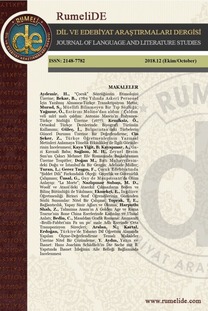Eski Rusçada dar ünlülerin düşmesi ve Çağdaş Rusçaya etkisi
Yaşayan her olguda olduğu gibi dilde de meydana gelen durağanlık hali dilin gelişim sürecinin bir sonucudur. Günümüz çağdaş dillerin yapısını ve işleyişini daha iyi anlamak için dili tarihsel açıdan incelemek önemlidir. Çağdaş Rusçanın durağan durumu yaklaşık 1300 yıllık umumi gelişiminin bir sonucudur ve günümüz Rusçasındaki yapısal ve işlevsel özelliklerin çoğu Rusçanın tarihsel geçmişinde saklıdır. Yapılan çalışmada, Eski Rusçanın yapısını kökünden değiştiren ve günümüz Rusçasının yapısını belirleyen dar ünlülerin düşmesi hususu araştırılmaktadır. XII.-XIII. yüzyıllarda gerçekleşen /ь/ ve /ъ/ ünlülerinin düşmesi Eski Rusçanın sesbilimsel yapısından başlayarak biçimbirimsel ve sözcükbirimsel düzeye kadar etkisini sürdürmüştür. Sunulan çalışmada dar ünlülerin düşme sürecinin tarihsel yönü incelenerek Çağdaş Rusça üstündeki etkisi ve izleri takip edilmeye çalışılmıştır. Bu amaç doğrultusunda şimdiye dek Rusçada dar ünlülerin düşmesi üzerine yayımlanmış olan araştırmalar göz önünde bulundurularak, özgün inceleme ve taramalara dayanarak, Çağdaş Rusçada bulunan bazı ses değişimleri açıklanmaya çalışılmıştır. Bu bağlamda özellikle yabancı dil olarak Rusça öğretiminde güçlük oluşturan konular arasında yer alan /о/→/ø/ ve /э/→/ø/ değişkelerin ve dar ünlülerin düşmesi süreci arasındaki ilişki üzerinde durulmuştur. Yapılan çalışmanın yenilikçi önemi, çağdaş yabancı dil öğretiminde tarihsel dilbilgisinin ve özellikle tarihsel sesbiliminin önemini vurgulamasıdır. Günümüz yabancı dil olarak Rusça öğretiminde çoğu zaman paradigmadan sapmalar olarak tanıtılan bazı ses ve biçimbirim değişiklikleri, dilin gelişimsel bir sürecin sonucudur. Bu yaklaşım yabancı dil öğretiminde bilişsel zemini desteklemektedir.
Anahtar Kelimeler:
Rusça, sesbilim, sesbilgisi, dar ünlüler, tarihsel sesbilimi
Loss of reduced vowels in Old Russian and effects on Modern Russian
As with any living phenomenon, the contemporary state of a language is a result of the development process. In order to have a better understanding of the structure and functioning of any contemporary language it is important to study the language from a historical perspective. The steady state of contemporary Russian is a result of a 1300-year-old development, and most of the structural and functional features of today's Russian are hidden in its past. The presented study is devoted to the loss of reduced vowels, which radically changed the structure of Old Russian and effected structure of contemporary Russian. The loss of /ь/ and /ъ/ vowels, which took place in XII-XIII centuries, that effected the phonetical level of Old Russian later continued to influence morphological and lexical levels. This study presents an attempt to trace the effects of a historical phonetical process to modern Russian. For this purpose, the studies published on the loss of reduced vowels in Old Russian were taken in to the consideration, as well as original scans and research were made in order to explain some sound changes in Contemporary Russian. In this sense, the phonological alternations /о/→/ø/ and /э/→/ø/, which are among the subjects that cause difficulties in teaching Russian as a foreign language, are carefully studied in terms of connections to the loss of reduced vowels. The innovative significance of this work is that it emphasizes the importance of historical grammar in contemporary foreign language teaching and importance, especially, of historical phonetics. In modern teaching Russian as a foreign language, some phonological and morphological alternations are often introduced as deviations from the paradigm, but they, actually, are the result of a developmental process of language and the part of the paradigm. This approach supports the cognitive base in foreign language teaching.
Keywords:
Russian, phonology, phonetic, reduced vowels, historical phonology,
___
- Alekseyev A.V. (2015). İstoriçeskaya grammatika russkogo yazıka. Moskva: Yurayt.
- Bernşteyn, S. B. (2005). Sravnitelnaya grammatika slavyanskih yazıkov. Moskva: MGU.
- Brauer, H. (1961). Slavische Sprachwissenschaft, Lautlehre. Berlin.
- Galinskaya, Ye. A. (2009). İstoriçeskaya fonetika russkogo yazıka. Moskva: MGU.
- Gasparov, B.M., Sigalov, P.S. (1974). Sravnitelnaya grammatika slavyanskih yazıkov. Tartu: TGU.
- Grutso, A.P. (2004). Staroslavyanskiy yazık. Minsk: Tetra Sistems.
- İvanova, T.A. (2005). Staroslavyanskiy yazık. S-Peterburg: Avalon/Azbuka – Klassika.
- Lehfeldt, Werner; Altmann, Gabriel. (2002). “Padeniye redutsirovannıh v svete zakona P. Mentserata.” Russian Linguistics 26, Netherlands: Kluwer Academic Publishers, s. 327-344.
- Lehfeldt, Werner; Altmann, Gabriel, “Protekaniye padeniye redutsirovannıh v drevnerusskom yazıke svete zakona Piotrovskih”, Russian Linguistics 27, Kluwer Academic Publishers, Netherlands, s. 141-149, 2003.
- Lunt, Horace G. (1974). Old Church Slavonic grammar. The Hauge-Paris: Mouton.
- Musatov, V.N. (2012). Russkiy yazık. Fonetika. Fonologiya. Orfoepiya. Grafika. Orfografiya. Moskva: Flinta.
- Popov, M.B. (2015). “K voprosu o padenii redutsirovannıh glassnıh v drevnerusskom yazıke: hronologiya, fonologiçeskiy mehanizm, otrajeniye v pamyatnikah”, Uçenıye zapiski Kazanskogo universiteta 157/5, Kazan: KGU, s. 47-67.
- Şahmatov, A.A. (1915). Oçerk drevneyşego perioda russkogo yazıka. Entsiklopediya slavyanskoy filologii, Petrograd: İmperatorskaya Akademiya Nauk.
- Şahmatov, A.A. (1916). Vvedeniye v kurs istorii russkogo yazıka. Petrograd: Nauçnoye delo.
- Şamanova, M.V., Talitskaya, A.A. (2018). Fonetika russkogo yazıka. İstoriçeskiy i sinhroniçeskiy aspektı. Yaroslavl: YarGU, 2018.
- Trubetskoy, N.S. (1987). “O zvukovıh izmineniyah russkogo yazıka i raspade obşçerusskogo yazıkovogo yedinstva”, İzbrannıye trudı po filologii, Moskva: Proress, s. 143-167.
- Zaliznyak, A.A. (2004). Drevnenovgorodskiy dialekt. Moskva: Yazıki Slavyanskoy Kulturı.
- Zaliznyak, A.A. (1992). “Padeniye redutsirovannıh po dannım berestyanıh gramot.” Rusistika segodnya. Funktsionirovaniye yazıka: leksika i rammatika, Moskva, s.82-105.
- Vigotskiy, L. S. (2018). Psihologiya iskusstva. Moskva: Ripolk-Klassik.
- Sidorov, V.N. (1966). İz istorii zvukov russkogo yazıka, Moskva: Nauka.
- Rusinov, N.D. (1979). Evolyutsiya i predistoriya russkogo yazıkovogo stroya, Gorkiy: GGU.
- Markov, V.M. (1964). K istorii redutsirovannıh glasnıh v russkom yazıke, Kazan: KGU.
- Levitskiy, V.V. (2007). Kvantitativnıye metodı v lingvistike, Vinnitsa: Novaya Kniga.
- ISSN: 2148-7782
- Yayın Aralığı: Yılda 6 Sayı
- Başlangıç: 2014
- Yayıncı: Yakup YILMAZ
Sayıdaki Diğer Makaleler
Hazırlıksız konuşma stratejileri
Bir yabancılara Türkçe öğretimi kaynağı olarak et-Tuhfetü ’l-Hamîdiyye fî ’l-Luğati ’l-Osmâniyye
Bilge Karasu’nun Forum dergisinde yayımlanan sanat yazıları (1954-1959)
Tezer Özlü’nün eserlerinde “an”ların işleniş formları ve epifanlar
اثری بر عليه خواب: نوای خروس همهدانی
Dīvānu Lugāti’t-Türk’te yer alan kumaş terimleri ve kelime kökenleri üzerine bir değerlendirme
Özel amaçlı Türkçe öğrenimine örnek tarihî bir ders kitabının incelenmesi
